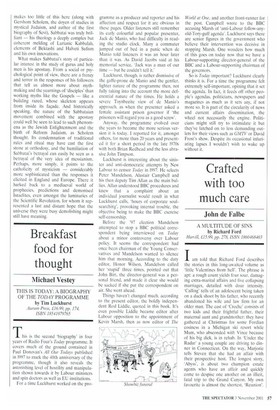Breakfast food for thought
Michael Vestey
THIS IS TODAY: A BIOGRAPHY OF THE TODAY PROGRAMME by Tim Luckhurst Aunon Press, £16.99, pp. 174, ISBN 18541079765 This is the second 'biography' in four years of Radio Four's Today programme. It covers much of the ground contained in Paul Donovan's All Our Todays published in 1997 to mark the 40th anniversary of the programme, though it also reveals the astonishing level of hostility and manipulation shown towards it by Labour ministers and spin doctors as well as EU institutions.
For a time Luckhurst worked on the pro
gramme as a producer and reporter and his affection and respect for it are obvious in these pages. Older listeners still remember its early colourful and popular presenter, Jack de Manio, who had difficulty in reading the studio clock. Many a commuter jumped out of bed in a panic when de Mania told listeners it was an hour later than it was. As David Jacobs said at his memorial service. 'Jack was a man of our time — but he couldn't tell it.'
Luckhurst, though, is rather dismissive of the gaffe-prone de Manio and the gentler, lighter nature of the programme then, not fully taking into the account the more deferential nature of the times. He holds a severe Toynbeeite view of de Manio's approach, as when the presenter asked a female assistant prison governor if 'the prisoners will regard you as a good screw'.
Anyway, the programme evolved over the years to become the more serious version it is today. I reported for it, amongst others, for more than 20 years and presented it for a short period in the late 1970s with both Brian Redhead and the less abrasive John Timpson.
Luckhurst is interesting about the sinister and anti-democratic attempts by New Labour to censor Today in 1997. He selects Peter Mandelson, Alastair Campbell and his then deputy Tim Allan as the main bullies. Allan understood BBC procedures and knew that a complaint about an individual journalist would result in what Luckhurst calls, `hours of corporate soulsearching', provoking internal trouble, the objective being to make the BBC exercise self-censorship.
Before the '97 election Mandelson attempted to stop a BBC political correspondent being interviewed on Today about a minor controversy over Labour policy. It seems the correspondent had once been chairman of the Young Conservatives and Mandelson wanted to silence him that morning. According to the duty editor, Honor Wilson, Mandelson called her 'stupid' three times, pointed out that John Birt, the director-general was a personal friend, and made it clear she would be sacked if she put the correspondent on air. She went ahead.
Things haven't changed much, according to the present editor, the boldly independent Rod Liddle, quoted in this book. It's even possible Liddle became editor after Labour opposition to the appointment of Kevin Marsh. then as now editor of The World at One, and another front-runner for the post. Campbell wrote to the BBC accusing Marsh of 'anti-Labour follow-anyold-Tory-guff agenda'. Luckhurst says there are senior figures in the government who believe their intervention was decisive in stopping Marsh. One wonders how much of this goes on today now that we have a Labour-supporting director-general of the BBC and a Labour-supporting chairman of the governors.
So is Today important? Luckhurst clearly thinks it is. For a time the programme felt extremely self-important, opining that it set the agenda. In fact, it feeds off other people's agendas, politicians, newspapers and magazines as much as it sets any, if not more so. It is part of the circularity of news and current affairs dissemination, the wheel not necessarily the engine. Politicians might still try to intimidate it but they've latched on to less demanding outlets for their views such as GMTV or David Frost's show. Despite its occasional infuriating lapses I wouldn't wish to wake up without it.


















































































 Previous page
Previous page